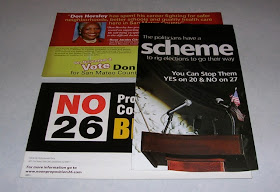
If you're a United States citizen, I hope you're planning to vote in the Nov. 2 elections. But are you getting totally swamped with election mailers, phone calls, and radio and TV ads?
Over the years, I've found a way that works for me to manage the election information. I ignore all of the items listed above; the mailers go into recycling, the phone calls are hung up on (politely, if it's a real person calling), and I change channels if an ad comes on the radio.
And honestly, I rarely read all the gory detail in the official voter guide. (In California this time, we have 10 state-wide propositions, as well as the local ballot measures, and all the candidates. Reading everything in detail just isn't how I want to spend my time.)
But I do want to be an informed voter. In reaching that goal, I've found these two resources help me the most:
1. Reasoned editorials
I don't want a clip-and-save list of who and what to vote for. Rather, I want to read why certain people and positions are being recommended. For state-wide issues, I tend to start with three newspapers, which don't always agree: The San Francisco Bay Guardian, the San Francisco Chronicle and the Sacramento Bee. By the time I've read their opinions, I usually have a good grasp of the issues, and can see where I might want to read more.
For local issues, I have a different list of sources. And if you follow my approach, your choice will differ from mine, being dependent on where you live and which editorial sources you find helpful.
2. SmartVoter
Here I can see position papers, biographical information, endorsement lists - and links to candidates' web sites. Sometimes what you read still comes across as sound bites, but often there's really useful information, too. And if a candidate chooses not to supply information to this nationwide non-partisan site managed by the League of Women Voters, that tells you something, too.
And after I've done my reading, having a discussion with friends who are also deciding how to vote can be very useful, too.
How do you wade through the election material clutter?
What candidate don't say can be more telling than what they do say. In the recent Australian elections a group asked all the parties to respond to a set of questions, they then posted the responses on their website. Very imformative and helpful.
ReplyDeleteOne party "declined to comment" on just about every question, except those relating to the environment, which is their major platform. Admitedly, some of the other parties' responses were wishy-washy - but at least they gave you something to gauge how much they aligned with your own point of view.
This particular party is a "balance of power" party, being the 3rd most popular in the country. As you may be aware, Australia voted for the two major parties evenly.
It was obvious that our election would be close and I was very wary of voting for someone who "declined" to tell me where they stood on just about everything.
The mailers & phone calls get ignored, as do the blurbs on the TV and radio. I mostly read newspapers and TRY to watch debates. But debates usually leave out the independents, unfortunately. Not that they usually have a chance to win, but it breaks up the usual 2-ideas discussions. And as SueBK said, sometimes it's what the candidates don't say. Sometimes, the candidates for local office are so close in their ideas, that it comes down to who I think can handle the position better.
ReplyDeleteSueBK, thank you for the Australian perspective. Having all candidates answer the same set of questions can sure be useful - I've seen this done here at times, too.
ReplyDeleteAnd, like you, I'd certainly be wary of any candidate who declined to tell me where he or she stood on the issues.
JustGail, good point about the debates. With no TV, my options there are to watch at someone else's place, or catch some or all of the debates on the web - which I sometimes do. And for local elections, I sometimes can make it to locally-held debates.
Thanks for the link to Smart Voter. I need to do my homework on the propositions and all the noise is very confusing. It's hard to find a place that gives just the facts.
ReplyDeleteThis is good advice. Yesterday I came home to SO MANY of those flyers stuffed in my mailbox! I want to be informed, but those flyers are anything but helpful unless you want to know which candidate has the worst haircut :-/
ReplyDeleteEllen and Gillian, I read the following on Twitter: "California is the only state in which voting can involve pulling an all-nighter." That's not much of an exaggeration for those of us who really want to make informed decisions.
ReplyDeleteThis coming election was more work than some others - because the editorials I read often didn't agree, and there were good arguments on both sides (buried under all the rhetoric).